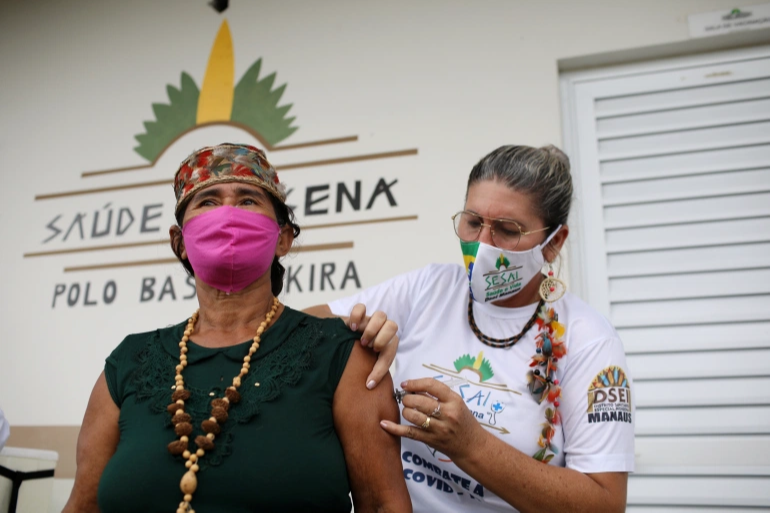
An Indigenous woman of Mura ethnicity at Makira village in the Rio Urubu area receives Sinovac’s CoronaVac vaccine in the Urubu river banks in Itacoatiara, Amazonas. (Photo: Bruno Kelly/Reuters)
Rio de Janeiro, February 19 (RHC)-- Indigenous nurse Almeida Tananta battled heavy downpours of tropical rains as he rode his motorbike for hours across the red-soiled dirt tracks of Tabatinga, a municipality in Western Amazonas, which borders the Amazon rainforest and Colombia, and has the largest concentration of Indigenous Brazilians in the Amazon.
Tananta was en route to apply the first doses of the COVID-19 vaccine to the remote Umariacu villagers, in Alto Rio Solimoes. But when he arrived at the village of wooden-thatched houses skirting the banks of the Amazon river, the nurse’s hopes of vaccinating the 1,037 villagers quickly vanished.
“Indigenous people of all ages are rejecting the vaccine. They’re terrified that if they take it, they’ll turn into an animal, or die”, Tananta told Al Jazeera. Tananta has worked with Indigenous communities like the Umariacu for more than 20 years and says the panic over the COVID-19 vaccine is a recent occurrence.
“Other vaccines are already well known. This COVID-19 vaccine is new. There are myths that China has contaminated the vaccine, that it comes with a chip designed to control Indigenous people,” he explains.
Indigenous communities living in remote villages are a priority group in Brazil’s national vaccination program as they only have access to basic medical services unequipped to treat the virus and most practise communal living. They have also become a target for misinformation.
Tananta partly blames the Brazilian president, Jair Bolsonaro, for sowing doubts about the vaccine’s efficacy, despite the country having the world’s second-highest death toll behind the United States. Bolsonaro has refused to take the vaccine himself and questioned the origins of CoronaVac, Brazil’s most widely available vaccine made by China’s Sinovac Biotech.
In October, he said on Facebook that “Brazilians will not be anyone’s guinea pig”. This has generated false rumours claiming that Indigeneous people are being made test subjects for the vaccine’s safety.
The president’s rejection of the Pfizer vaccine has also fanned the flames for conspiracy theories. Citing a claim that shielded the US from liability for the vaccine’s collateral effects, (a clause signed by multiple countries), Bolsonaro joked that he would not take responsibility if you turned into an alligator, Superman or if women grew beards after having the shot.
In Umariacu, which reported the first case of COVID-19 infection among Indigenous people, the false rumours can be found on Facebook timelines, WhatsApp groups and on radio shows heard by communities particularly vulnerable to coronavirus. Vaccination is especially urgent in Amazonas state where the healthcare system in capital city Manaus collapsed last month.
A sudden surge of infections reportedly caused by a more contagious variant led to an explosion of hospital demands, severe oxygen shortages and thousands of deaths. Officials fear it could ravage Indigenous tribes if the vaccine does not come soon enough.
Nurse Tananta’s wife, Telma Aparicio, died from complications from COVID-19 on December 21.
“Unfortunately for my wife, the vaccine didn’t arrive in time. But she, without a doubt, would have taken it … I feel extremely proud that I’m working to prevent many more Indigenous lives from being lost,” Tananta said.
At least 957 Indigeneous people, including notable tribe leaders such as Chief Aritana Yawalapiti from Mato Grosso’s Xingu have died from COVID-19, according to APIB, Brazil’s largest Indigenous rights group. But the numbers are believed to be underreported as SESAI, the government’s Indigenous health agency, only counts deaths of those living within demarcated Indigenous lands – excluding around 33 percent of the Indigenous population.
Tananta is on a mission to dispel false claims. “When they refuse, I try to explain to them that the vaccine is the only cure. But some still resist,” he said. When the nurse left Umariacu the first time, he only managed to vaccinate 500 inhabitants.
The reality is no different for other Indigenous villages. Deep in Mato Grosso state, in the vast Xingu National Park, skirting the Tuatuari river, Walamatiu Yawalapiti, a medical student, told Al Jazeera that his people, comprising 16 different ethnic groups, had received false rumours about the vaccine from social media, missionaries and on the radio claiming that the vaccine would kill people.
Health experts and leaders have also blamed Evangelical missionaries operating in remote communities for scaremongering Indigenous tribes against the COVID-19 jab. “Much of the disinformation is coming from -religious fundamentalists and Evangelical missionaries. They say the vaccine is ‘against God’ and threaten to expel those that take the vaccine from the church. It’s inhumane,” laments Dinamam Tuxa from APIB.
Some experts say that not all Evangelists are against the vaccine. “There are many videos showing Evangelical pastors taking the vaccine”, said anthropologist Tatiane Klein, from the Centre of Amerindias of USP and researcher of the Guarani people in Mato Grosso do Sul. Due to deforestation, they live on tiny patches of land where soybean and cattle ranching reign as a result of a violent past of attacks from farmers stealing their lands.

